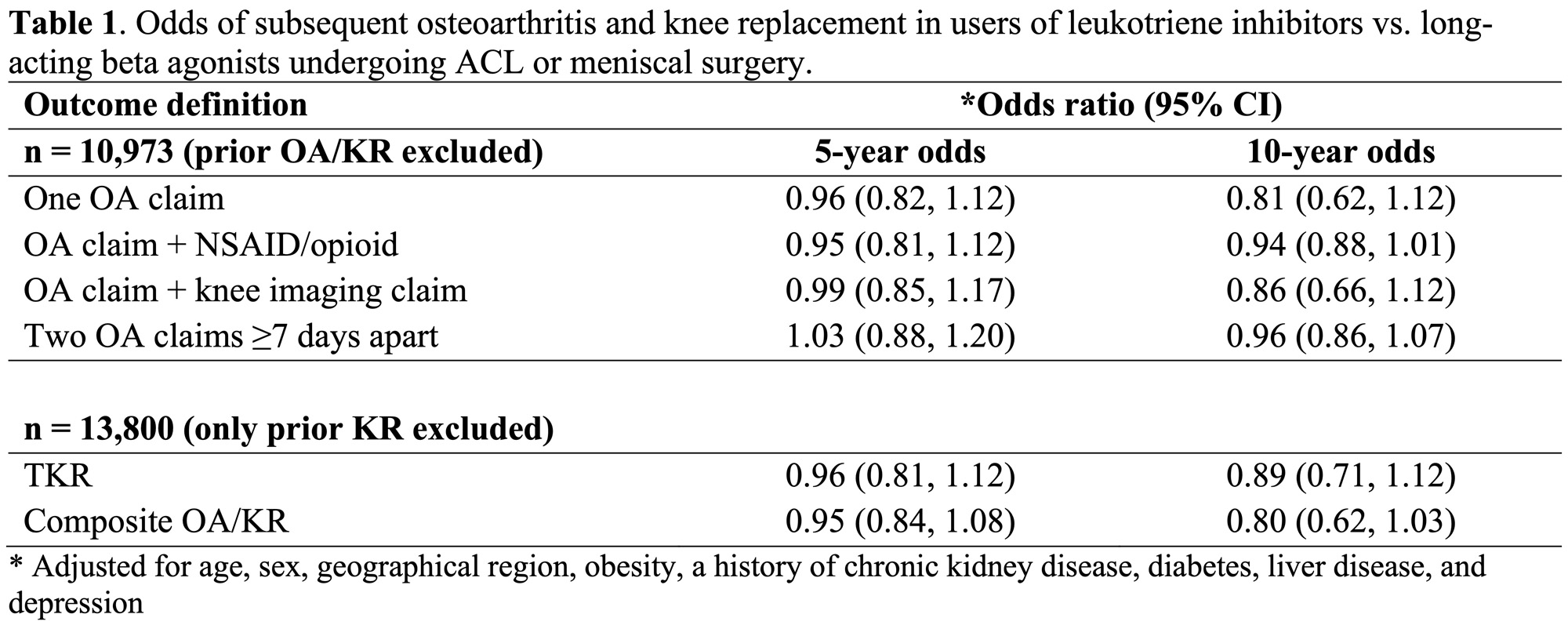Session Information
Date: Sunday, November 12, 2023
Title: (0145–0154) Epidemiology & Public Health – Interprofessional Poster
Session Type: Poster Session A
Session Time: 9:00AM-11:00AM
Background/Purpose: Joint injuries frequently lead to post-traumatic osteoarthritis (OA), a disabling condition often affecting young adults, impacting their quality of life and creating substantial economic consequences for society. To fill the therapeutic void, drug repurposing is an attractive alternative to traditional drug development, which is costly and slow-moving. The aim of this work is to assess the effectiveness of leukotriene inhibitors on preventing post-traumatic OA compared with long-acting beta agonists, both of which are commonly used drugs for asthma. Leukotriene inhibitors suppress mast cell products, and data from mouse models suggest that inhibiting mast cell activation and downstream inflammatory processes can prevent OA.
Methods: Persons with a claim for anterior cruciate ligament (ACL) or meniscal surgery between 2006 and 2020 were drawn from MarketScan Commercial Claims and Encounters (Merative) databases. The date of the surgery claim was defined as the index date. Enrollees were eligible if aged 18-45 years on index date and if they had continuous enrollment for at least 6 months prior to the index date (baseline period) and 12 months after the index date (follow-up period). Additionally, subjects had to be users of leukotriene inhibitors (montelukast, zafirlukast, or zileuton) or an active comparator that consisted of long-acting beta agonists (albuterol, arformoterol, formoterol, indacaterol, olodaterol, salmeterol, terbutaline, or vilanterol) for any duration from the index date up to 6 months after. The study outcomes were identified as claims for OA and/or knee replacement (KR) during the follow-up period, which for OA was the first claim 12 months after the index date to minimize misclassifying trauma as OA. Various definitions of outcome were considered, which included OA claims with and without NSAIDs or opioid prescription or knee imaging (X-ray or MRI) within a year, and a composite outcome of OA and KR. Exclusions consisted of subjects with a history of chronic obstructive pulmonary disease, a prior KR, or a prior OA diagnosis (for OA outcomes only). We used causal inference-based targeted learning estimated through ensemble machine learning to compare incident outcomes among users of leukotriene inhibitors with comparator users within 5 and 10 years, accounting for loss to follow-up by incorporating inverse probability weighting for censoring.
Results: Data included 13,800 persons (50.0% female, mean age = 35.4 [SD = 8.5] years) who underwent ACL/meniscal surgery. Compared with users of long-acting beta-agonists, the odds of KR, adjusted for confounders and loss to follow-up, was about 4% lower at 5 years and 11% lower at 10 years follow-up in users of leukotriene inhibitors undergoing surgery (Table 1). For OA outcomes, the odds of short- and long-term outcomes similarly showed a modest decrease for leukotriene inhibitor users compared with users of comparator drugs, however, estimated confidence intervals crossed the null.
Conclusion: Users of leukotriene inhibitors undergoing ACL or meniscal surgery may have lower odds of post-traumatic OA compared with users of long-acting beta agonists.
To cite this abstract in AMA style:
Jafarzadeh S, Baker M, Peloquin C, Robinson W, Felson D. Leukotriene Inhibitors Effect on Post-Traumatic Osteoarthritis: A Real-World Evidence Comparative Effectiveness Study [abstract]. Arthritis Rheumatol. 2023; 75 (suppl 9). https://acrabstracts.org/abstract/leukotriene-inhibitors-effect-on-post-traumatic-osteoarthritis-a-real-world-evidence-comparative-effectiveness-study/. Accessed .« Back to ACR Convergence 2023
ACR Meeting Abstracts - https://acrabstracts.org/abstract/leukotriene-inhibitors-effect-on-post-traumatic-osteoarthritis-a-real-world-evidence-comparative-effectiveness-study/

